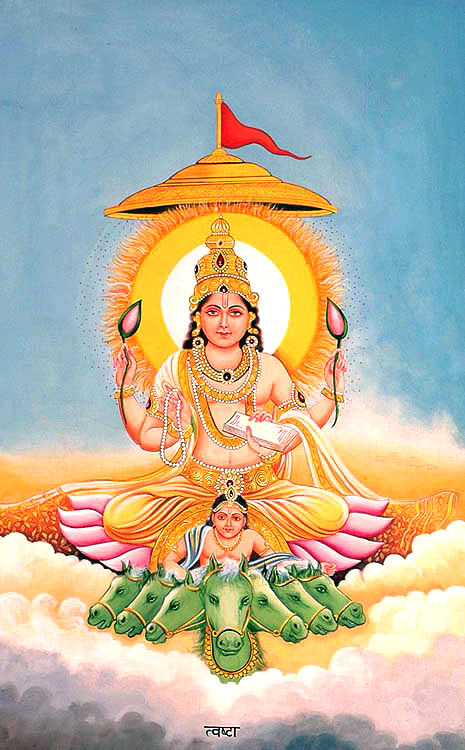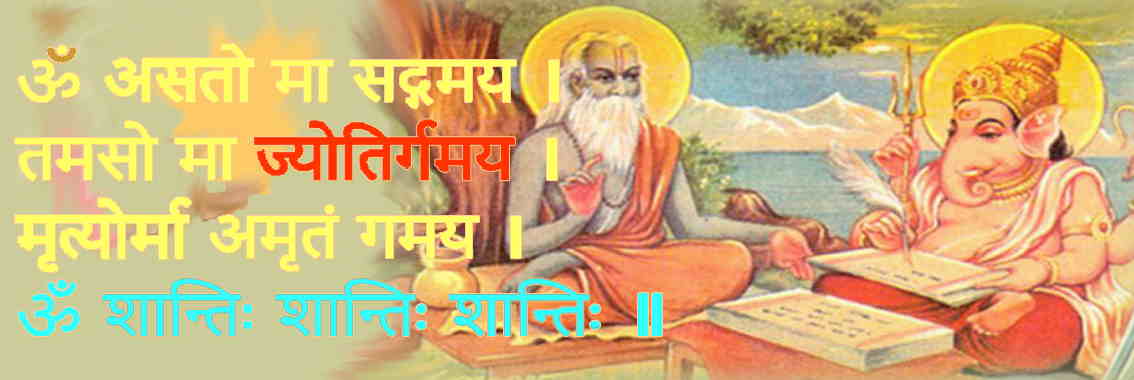
Sun will transiting the sidereal sign of Aquarius from February 13th to March 15th. The Aditya or Sun in Aquarius is called Tvaṣṭṛ or simply Tvaṣṭā. He is the celestial architect blessed with supreme intelligence. His character is akin to the archetype of a ‘Magician’ – an innovator, as he created the universe with Maya. Tvaṣṭṛ literally means the maker of carriages or a carpenter (त्वष्ट्रेव विहितं यन्त्रम्). He is skilled with tools and the maker of divine implements for both devas (divine) and asuras (demonic forces), hence a diplomat. The story goes that he rescued his daughter Saṁjñā from the effulgent rays of her husband Vivaswān by cutting it. He made use of it for Indra’s Vajra (thunderbolt), Viṣṇu’s chakra (discus) and Śiva’s Trisula (trident). The meaning of Tvaṣṭā from the Sambha Purana is from the root word tuṣ (तुष्) meaning pleasing. He is happy and content, he goes about creating all the people. The Purana goes on to further say that he is the in-dweller in all plants in forests and also of all medicinal herbs. He is the guardian of Soma and the sign Aquarius is known as ‘kumbha’ which is a pot. All the drugs and medicines are manufactured in Aquarius. Tvaṣṭā is known as the deity ruling the Chitra nakṣatra which falls between Virgo and Libra and bridges the qualities of perfection with practicality.
Tvaṣṭā is most known for his ambivalent attitude to Indra, the King of the heavens. In modern times we would describe Tvaṣṭā as a ‘Frenemy’ ( a word now in the Oxford dictionary) of Indra. I am sure we have all encountered situations when indulge in relationships with persons who seemingly befriend us, but have had a separate secret agenda that is not in our interest. Tvaṣṭā is credited with designing Amaravati for Indra and gifting him the heavenly garden Nandana where the kalpavrikśa (wish fulling tree) stands heavily guarded by the apsaras (heavenly nymphs). He stood on the side of Indra and fought against Kṛṣṇa and Arjuna when the forest of Khāṇḍava was burnt to build a capital city for the Pandava Princes. However, he is also in conflict with Indra many times, though Indra wins every time by whatever means. Indra killed Tvaṣṭā’s son Vishwarupa after appointing him the preceptor of devas. Vishwarupa’s mother was an Asura and his suspicion that Vishwarupa was favouring Asuras led him to kill him in a fit of rage. To avenge his death, Tvaṣṭā created Vṛtra, a demon to kill Indra. Indra went into hiding while Vṛtra stole all the water in the world to get Indra to fight with him. Indra tricked him by using Rambha, the apsara to distract him and killed him with this Vajra – thunderbolt made out of Dadhichi’s bones. In another version of the story, Indra had drunk a large volume of Soma at Tvaṣṭā’s house to empower himself before facing Vṛtra. Indra is in the 10th house (digbala position of the Sun) and 2nd from that is what is consumed for sustenance, which is Aquarius in the natural horoscope where Soma is. Indra is habituated to drinking Soma from his time in the womb of Aditi.
Sun joins Venus and Saturn in Aquarius only for a few days until Venus leaves Sun with Saturn together for the month. Saturn has been in combustion from 31st January and will remain combust till the 5th of March. Combustion leads to purification, it’s a time to think about the direction of our actions. The exact conjunction of Sun and Saturn takes place on the 16th February in Dhanishta nakṣatra. The association of Sun with Saturn is not very favourable and it is called a ‘pitra dosha’ that invites the wrath of ancestors. Progress may be thwarted.
Sun stands for our soul, also for authority and wealth. Sun on its own in Aquarius is uncomfortable, more so in Capricorn as it is not very happy in the sign owned by its enemies Saturn and Rahu. The sojourn of Sun in Aquarius can bring with the challenges of the relationship of Tvaṣṭā and Indra recounted earlier. Saturn is always trying to topple authority, more so in the case of Saturn in Aquarius as it casts its third aspect on the Aries, the royal sign. To appease Saturn, I find that it is best to worship the Divine mother, as Saturn’s real angst with Sun, his father was about the treatment of his mother Chāyā. It is a good time for pilgrimages and ablutions in the holy rivers.
The nature of Rahu is to eclipse the Sun, in medical terminology to cause blindness. Aquarius is associated with blindness. It is said that the Sun is in Aquarius in the 7th house or Mars in the Ascendant in Aquarius leads to blindness, especially in the nakṣatra of Śatabhiṣa which is ruled by Rahu. The other two nakṣatras of Aquarius also cause diseases – Sun in Dhaniṣṭha causes heart disease (Dhaniṣṭha is the point of sound- the ultimate sound is the heart beat) and Sun in Pūrva Bhādrapadā can cause mental imbalances as it is the manas tara. The 11th house is the 6th from the 6th house of disease and can be punishing. The 11th house is a double-edged sword. It keeps our soul tied to samsara and re-birth as it is owned by Rahu, the karaka for re-birth. The planets in the 11th house propel us to satisfy our desires, yet there is no permanent satisfaction as one desire replaces the other. The 11th house is also an upachaya – a place for improvement not necessarily materially, that is why it is said that a strong connection of the 11th house with the Atma Karaka is necessary for a spiritual path and get over samsara. I will be talking more about this in my BAVA lecture this year on the 30th April on “Rahu and Free Will”.
Venus joins Jupiter in Pisces on the 17th of February where it is exalted. Venus and Jupiter remain in Pisces until Venus leaves for Aries on the 12th of March. The sign Pisces is hemmed by Saturn in Aquarius and Rahu in Aries on either side, suffering from a papa kartari yoga until November. As Jupiter is the preceptor of devas (light) and Venus the preceptor of asuras (darkness), one can notice a tendency to vacillate between the polarities of spiritualism and materialism in individuals who have this conjunction in their natal horoscope. It is also possible for those who have these combination or association to look for spirituality in the material world or indulge in materialism in a spiritual world. According to Saravali, natives with this combination will have professions related to education and be skilled in debating.
Venus moves into Revati nakṣatra on the 1st of March and the exact conjunction between Jupiter and Venus takes place in the early hours of the 2nd of March. Revati is place of unconditional love; some say unrequited from the story of Chandra (Moon) who had 27 wives from the 27 nakṣatras, the story goes that while Revati loved Chandra the most unconditionally, he preferred the company of Rohini (not his exaltation point). There is a quality of idealism and a feeling of divine adoration when Venus is exalted in Revati. This conjunction provides an opportunity to attract beautiful and finer experiences around us provided the conjunction falls in an auspicious house. Care should be taken though not to exceed the boundaries in material pursuits as Moon will be in Ardra nakṣatra (tear drop) at the exact time of conjunction and Venus wins in the war between Jupiter and Venus. It should be noted that in the aftermath of this conjunction and winning of the war Venus will also be joining Rahu in Aries which is not very healthy.
Rahu and Ketu remain in Aries and Libra for the entire month; the stubbornness of our actions expressed through Mars in Taurus until late in the evening of 12th of March. Mercury moves into Aquarius to join Saturn and Sun on the 27th of February, get into a war with Saturn which it loses on the 2nd (on the same day when there is a war between Jupiter and Venus) as it crosses over Saturn.
Maha Shiva Ratri falls on the 18th February. It is observed on the night of the 14th tithi in the dark half of the lunar month of Magha by worshipping Shiva. We celebrate Holi on the 8thth March with colours to mark the start of the spring season, the season of love It is also a date Kamadeva was forgiven for shooting an arrow that made Lord Shiva fall in love with Parvati. A bonfire is held the night before to symbolise victory over evil as Prahlāda (the son of Hiraṇyakaśipu, a might asura king) survived being burnt alive by the grace of Vishnu, whereas Hōlikā (sister of Hiraṇyakaśipu, also known as Simhika) was incarcerated in the attempt.
ॐ घृणि: त्वष्टादित्य
om ghṛṇi tvaṣṭāditya

